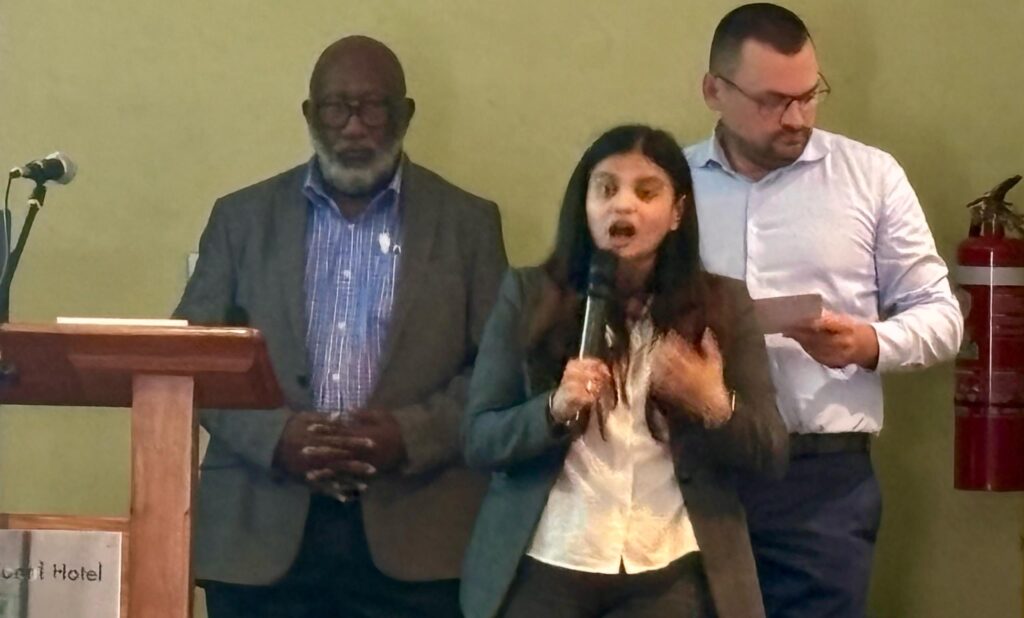Lae, Morobe Province, Tuesday, April 8, 2025 — Senior representatives from the World Bank and International Finance Corporation (IFC) have called for urgent reforms and stronger private sector participation to unlock the full potential of Papua New Guinea’s agriculture sector, during a keynote session at the National Agriculture Industry Public-Private Sector Partnership Conference held in Lae on Monday, April 7, 2025.
Delivering their addresses to a packed audience of government officials, agribusiness leaders, farmers, and development partners, Anuja Kar, Senior Agriculture Economist for the World Bank in East Asia and the Pacific, Tankut Erkan, Senior Investment Officer for Manufacturing, Agribusiness and Services at IFC, and Allan Oliver, Senior Agriculture Specialist, said PNG stands at a historic turning point—one where agriculture can serve as a foundation for inclusive growth, climate resilience, and food sovereignty.
Agriculture: A Sleeping Giant
“Agriculture is not just an economic sector in PNG—it’s an essential part of culture, identity, and community livelihoods,” said Ms Kar. “Yet despite employing over 80% of the population and contributing more than a quarter of GDP, the sector remains underfunded and underperforming.”
She said the lack of infrastructure, access to finance, poor connectivity, and vulnerability to climate shocks continue to hold back rural farmers and agribusinesses. “The sector’s potential is immense, but we need targeted investment, modern practices, and strong public-private partnerships to move from subsistence to sustainability and profitability,” she stressed.
Ms Kar commended the Marape Government’s National Agriculture Sector Plan 2024–2033 (NASP) and the proposed National Agricultural Credit Scheme, calling them “game-changing frameworks” that, if implemented effectively, could draw in private capital and improve rural livelihoods.

Building the Business Case for Investment
Speaking alongside Kar, IFC’s Tankut Erkan emphasised the importance of creating bankable agribusiness projects that can attract local and international investors.
“PNG is home to world-class cocoa, coffee, spices, and high-value fresh produce. But we must address the perception of risk that keeps investors away,” Erkan said. “Clear policies, investment-friendly regulations, and better rural infrastructure are essential if we are to make agriculture competitive.”
He said the IFC is supporting several initiatives in PNG and the Pacific to improve access to finance, boost productivity, and strengthen market linkages. “Blended finance, credit guarantees, and public-private risk-sharing can all help de-risk agriculture and catalyse private sector growth,” he added.
Erkan also highlighted the need to connect smallholder farmers to global markets, strengthen agribusiness value chains, and invest in post-harvest infrastructure such as cold chains, storage, and processing facilities.
Climate Resilience, Innovation and Inclusion
Both speakers agreed that any modernisation of the sector must be climate-smart and inclusive.
“Climate change is already affecting yields and threatening food security,” Kar said. “We must invest in resilient crops, smart irrigation, agroforestry, and early warning systems—and ensure that women and youth are not left behind.”
Erkan echoed this, adding that innovation must go hand-in-hand with sustainability. “Digital agriculture, remote sensing, and data analytics are no longer luxuries—they are essential tools for efficient farm management and global market access.”
A New Chapter for PNG Agriculture
The conference in Lae, themed “Strengthening Public-Private Partnerships for a Sustainable and Competitive Agriculture Sector in PNG,” is part of Papua New Guinea’s broader efforts to revitalise agriculture as the country celebrates its 50th anniversary of independence.
In his keynote address, Prime Minister James Marape reaffirmed the government’s commitment to empowering rural communities and positioning agriculture as the engine of economic transformation and import replacement.
“This is not just about production—it’s about nation-building,” Kar concluded. “The future of PNG’s agriculture depends on the strength of its partnerships—between farmers and financiers, government and industry, tradition and technology.” “The time to invest is now,” Erkan added. “If we work together, PNG can become a leading exporter of sustainable, high-value agricultural products in the region.”
ENDS